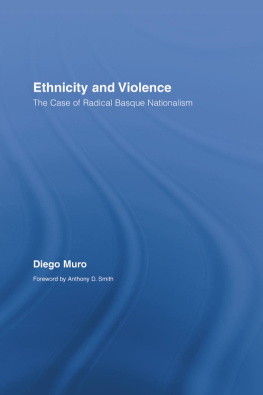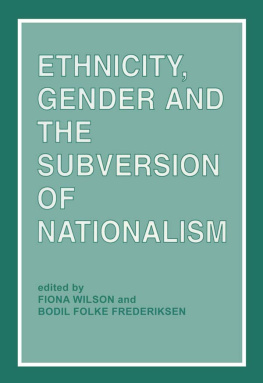Ethnicity and Nationalism in
Italian Politics
Inventing the Padania: Lega Nord and the northern
question
MARGARITA GMEZ-REINO CACHAFEIRO
Universidad de Salamanca, Spain
First published 2002 by Ashgate Publishing
Published 2016 by Routledge
2 Park Square, Milton Park, Abingdon, Oxon OX14 4RN
711 Third Avenue, New York, NY 10017, USA
Routledge is an imprint of the Taylor & Francis Group, an informa business
Copyright Margarita Gmez-Reino Cachafeiro 2002
All rights reserved. No part of this book may be reprinted or reproduced or utilised in any form or by any electronic, mechanical, or other means, now known or hereafter invented, including photocopying and recording, or in any information storage or retrieval system, without permission in writing from the publishers.
Notice:
Product or corporate names may be trademarks or registered trademarks, and are used only for identification and explanation without intent to infringe.
British Library Cataloguing in Publication Data
Gmez-Reino Cachafeiro, Margarita
Ethnicity and nationalism in Italian politics: inventing
the Padania: Lega Nord and the northern question. -
(Research in migration and ethnic relations series)
1. Nationalism - Italy, Northern 2. Ethnicity - Italy,
Northern 3. Italy - Politics and government - 1994-
I.Title
320.945
Library of Congress Control Number: 2001091558
ISBN 13: 978-0-7546-1655-9 (hbk)
This book is mostly based on a dissertationonly was added to the original manuscript written at M.I.T. First of all, I would like to thank my advisor, Suzanne Berger, and the other members of my dissertation committee, Richard Locke, Anthony Messina and Torben Iversen, for their comments, criticisms and suggestions throughout the years. In this book I attempted to respond to their final suggestions and criticisms. I hope I have somehow done it, although it was always hard to meet their standards. I also would like to thank the Massachusetts Institute of Technology and the Harvard-Center for European Studies for their financial support to conduct my research in Italy in 1995 and 1996. In Cambridge I thank my colleagues and friends Inger Weibust, Phineas Baxandall and Jonathan Schleffer for their comments and criticisms on many drafts. I would also like to thank my colleagues in the reading group of the Department of Anthropology of Harvard University for their suggestions and criticisms about my writing. Special thanks to the Abby Collins and the Center for European Studies at Harvard University for the two wonderful years I spent there as an affiliate. In Italy I would like to thank the Facolta di Studi Politci e Sociali at Universita Statale de Milano for an institutional affiliation in 19951996. My friend and colleague Francesco Zucchini deserves special thanks for his generous help on collecting data and understanding Italian politics. I also would like to thank the members of Lega Nord for their time and information, although I keep them anonymous here. In the Netherlands I would like to thank Karen Phalet and Meindert Fenemma for their comments on part of this manuscript. In Belgium I also would like to thank Marc Swyngedouw for his criticisms on parts of this manuscript and for providing the institutional space to finish this book in the Department of Sociology at Katolieke Universiteit Leuven. I am grateful to my friends and families in Spain, Italy and the United States for their support and encouragement. This book is dedicated to Bill Patley Jones, in memoriam.
Margarita Gmez-Reino Cachafeiro
Salamanca
Introduction
The erosion of the traditional cleavages that structured West European party systems (class, religion) has become an uncontroversial fact in the study of political change in Europe. Over the past two decades, scholars have studied electoral de-alignment and provided new analytical frameworks to explain the sources of political change and the creation of new cleavages. In the 1970s the main novelty in European politics was the rise of Green parties and ecological issues. In the past decade, a new family of parties, the alternatively labeled new radical right, new extreme right or populist right, with an agenda based on anti-migrant rhetoric and tax issues, became politically visible. Yet during the 1990s political change in Europe went far beyond the question of new party mobilisation and the emergence of new cleavages. This past decade brought economic and political changes that today reinforce new images of disintegration of nation-states and national political economies. The end of Cold War alignments and the relaunching of European integration have accelerated socio-economic transformation of the European continent at a major scale. A revival of nationalism in a variety of forms dominated political debates in Eastern Europe and the ex Soviet Union, but also in the pluralist democracies of Western Europe. At stake are the redefinition of categories of belonging and solidarity, and the politics of inclusion and exclusion in the construction of a European polity.
This book examines an unexpected political development: the rise of new parties in Northern Italy claiming self-government upon the basis of a national and cultural distinctive North. By all accounts peripheral nationalism is an old political conflict (the center-periphery or ethno-territorial cleavage in European party systems) but also it is, as this book shows, a political breakthrough, a new product of recent trends. However, in the 1980s and early 1990s political mobilisation diffused to most of the Northern ordinary regions of Italy. In short, this book investigates the rise of Lega Nord and the political revolt of the Italian North.
The study of new party mobilisation in Northern Italy allows us to address current debates on the direction and scope of political change in European politics. Scholars writing on political change in European party systems associate new political mobilisation in Northern Italy with three related issues. First, Lega Nord s claims of nationhood and demands of self-determination and secession from the Italian state are linked to a global revival of nationalism after 1989. During the 1990s nationalism became again a major driving force in politics worldwide. The breaking-up of the Soviet Union and Yugoslavia provided closer images of the destructive powers of the national idea in contemporary politics. Today, some scholars even argue, as Seyla Benhabib writes: the negotiation of identity and difference is the political problem facing democracies on a global scale (Benhabib, 1996, p. 3). Second, the rise of Lega Nord is tied with a political backlash in European societies manifested by the success of new radical right-wing parties and the spread of xenophobic, ethnocentric and racist sentiments against new migrants. Le Pens Front National, the Flemish Vlaams Blok, and Haiders FP are today well-known examples of the political successes of anti-migrant mobilisation. Third, Lega Nords demands for political autonomy are also analysed within a new institutional scenario in the European Union that undermines both the political and economic unity of nation-states. European integration allegedly strengthens the viability of national sub-units in their pursuit of economic and political autonomy from central governments. Thus, the rise of Lega Nord is at the center of crucial debates not only about the creation of new cleavages in European party systems, but also, and more broadly, about the very sustainability of traditional nation-state boundaries as we know them.












